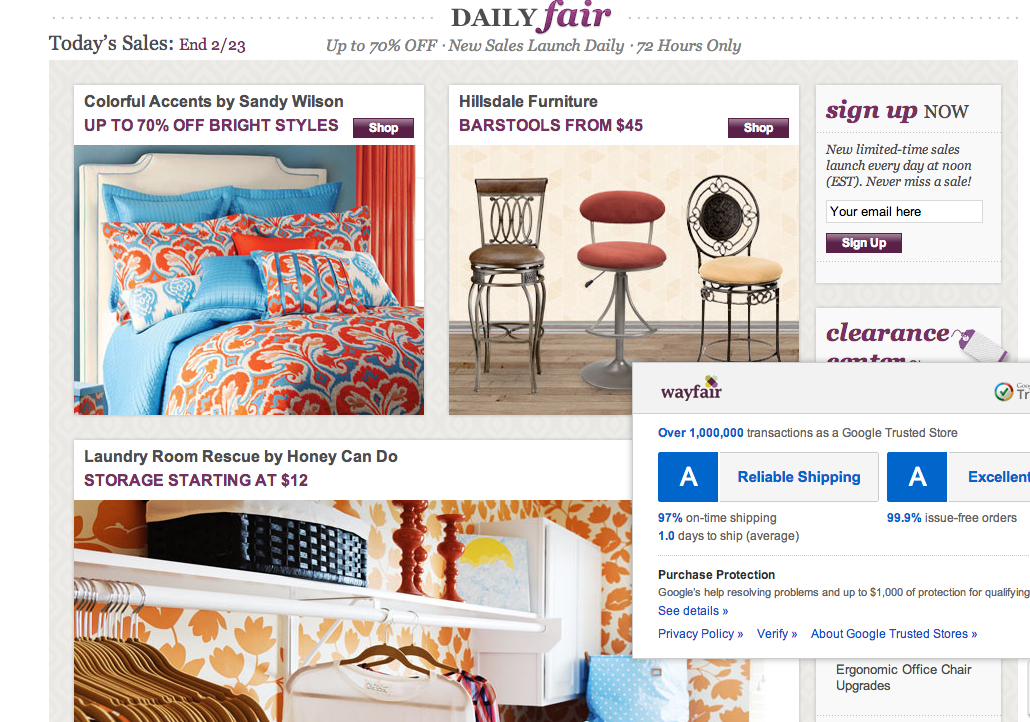 Wayfair launched a new flash sale feature today called Daily Fair.
Wayfair launched a new flash sale feature today called Daily Fair.
The now 10-year-old and extremely well-capitalized startup is one of the largest online retailers of home goods and furnishings, with a selection of more than five million products. Daily Fair will feature seven new sales a day, seven days a week, which will each last for 72 hours — and offer up to 70 percent off.
Flash sale sites took off in 2012, offering an exciting new e-commerce business model that attracted millions of consumers, millions of dollars in revenue, and millions of dollars in venture capital. Zulily and One King’s Lane raised $85 million and $50 million, respectively, from big name investors, and Rue La La, Gilt, and Fab.com have large, active, and spending user bases.
Wayfair’s new feature is not just an attempt to hop on the trend wagon — it’s the latest step in Wayfair’s quest to be definite online destination for home goods. During an interview with VentureBeat, founder and CEO Niraj Shah said that e-commerce only makes up 6 percent to 10 percent of total retail sales for home goods — and this number is going up.
“Most people don’t buy home goods until they are 30 years old and have a house or are married with kids.” Shah said. “The group that is at this stage in their life now is the first to grow up with the internet, so their willingness to buy online is high compared to other folks and it goes up every year. E-commerce keeps on getting better and better and people feel more comfortable making purchases online. We want people to start by looking here, because we have everything. There is a pretty big opening here and we are going to run with it.”
Convenience is also a key factor here. Many people (present company included) don’t want to dedicate their nights or weekends to furniture shopping. With online ordering, consumers can peruse multiple options, make comparisons, and have purchases delivered to their door without schlepping from place to place.
The flash sale feature is intended to add an additional layer of convenience, as well as attract a different category of user. Wayfair’s massive selection can be overwhelming, and flash sales are appealing to people who don’t want to hunt for a specific item.
Wayfair claims to be the first mass retailer to integrate daily flash sales into its business model. The promotion will go out at noon each day, and will feature products linked by theme or category, as well as a selection curated by bloggers, designers, and other “influencers from the home community.”
Shah founded Wayfair back in 2002, long before e-commerce was as mainstream as it is now. Back then, it was an amalgamation of small, item-specific sites that in 2011 became an integrated entity known as Wayfair. To support this transition, the company took institutional money for the first time and has raised more than $200 million to support its growth. Wayfair broke $600 million in sales in 2012 and sees over 12 million visitors a month. This success is largely due to focusing on customer needs and the overall user experience.
“People want their homes to be unique and feel personal,” he said. “They want a very big selection so they can find the exact thing they want at a good price, and ‘best-sellers’ aren’t really a priority. You can’t inventory everything in a warehouse and turn the inventory. We amassed the selection all-in-one place by working with 5,000 different manufacturers, and then build the supply chain and transportation delivery network to deliver it to the customer.”
Competitors include traditional retailers like Target, Sears, and Pottery Barn as well as e-commerce giant Amazon. The “home goods” sector includes everything from extremely expensive designer couches to cheap lighting, and Wayfair attempts to bring it all together under one digital roof. The main challenge left? Building any furniture that comes unassembled. But at least there are other services for that.
VentureBeat's mission is to be a digital town square for technical decision-makers to gain knowledge about transformative enterprise technology and transact. Learn More
